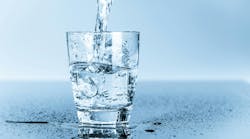By Patrick Crow,
Washington Correspondent
Sen. Barbara Boxer (D-Calif.), the new Environment and Public Works Committee chairman, has introduced two bills to protect drinking water from perchlorate contamination. Cosponsors were Sens. Dianne Feinstein (D-Calif.) and Frank Lautenberg (D-N.J.).
The chemical, from rocket fuels and explosives, has been detected in the drinking water supplies for more than 20 million Americans in 35 states.
Boxer said EPA has declined to set a standard for safe perchlorate levels in drinking water.
One bill would direct EPA to promptly establish a health advisory, followed by a drinking water standard, for perchlorate. The standard would have to protect the health of pregnant women and children. The second bill would assure require tap water to be tested for perchlorate and the public to be notified when drinking water is contaminated.
The Senate committee is expected to hold hearings on the bills this spring.
Program to Help Rural Water Systems
President George W. Bush has signed a bill, passed in the 109th Congress last year, to establish a loan guarantee program within the Interior Department’s Bureau of Reclamation to help communities finance new water projects and pay for maintenance on existing water systems.
Cosponsored by Senators Pete Domenici (R-N.M.) and Jeff Bingaman (D-N.M.) the Rural Water Supply Act authorized $15 million a year for planning new water delivery infrastructure. It would allow rural communities and bureau projects to obtain loans at interest rates lower than loans not guaranteed by the federal government. The legislation also expedited the appraisal and feasibility study process for communities.
Domenici said many Bureau of Reclamation projects are nearing 100 years of age and are unable to afford operation, maintenance and rehabilitation costs.
The legislation was endorsed by NRWA, the Western Governors’ Association, the Western States Water Council, NWRA, and the Family Farm Alliance.
Surface Coal Mining Contaminating Private Wells
The U.S. Geological Survey has reported that private water wells in reclaimed surface-coal-mining areas of the northern and central Appalachian Mountains have shown traces of mining-related contaminants. It said the contaminants typically decreased to background levels at distances 1,000 feet or more from surface coal mines and in wells deeper than 150 feet.
“Iron and manganese were commonly detected at concentrations exceeding EPA drinking water standards,” USGS said.
The study compared ground-water quality in 58 privately owned wells downgradient of reclaimed surface coal mines to that of 25 wells in unmined areas. The comparisons were made in western Pennsylvania and West Virginia.
Separately, USGS said groundwater tests in the Piedmont Aquifer System (PAS) met most federal standards.
The PAS is a major eastern US aquifer that follows the eastern foothills of the Appalachian Mountains. It underlies portions of Alabama, Georgia, South Carolina, North Carolina, Virginia, Maryland, Pennsylvania, Delaware, New Jersey, and southern New York. It provides drinking water for 7 million people.
USGS said many chemicals were detected in the ground water, but concentrations were below drinking-water standards in most cases. For example, none of the 47 pesticides or 59 volatile organic compounds (VOCs) analyzed exceeded drinking water standards.
Association Leaders Discuss Industry’s Future
The officials of major North American water and wastewater organizations have concluded a summit to discuss major initiatives, priorities and programs for 2007.
AWWA Executive Director Jack Hoffbuhr said the meeting was an opportunity for water association executives to build relationships, discuss areas of collaboration, and share perspectives on major issues.
“Our hope is that this understanding will enable us to serve our members more effectively as we work to protect the public health by providing a safe and secure water supply,” he said.
Participants included AWWA, the Association of Metropolitan Water Agencies, the National Association of Clean Water Agencies, the National Association of Water Companies, the National Rural Water Association (NRWA), the National Water Resources Association (NWRA), and the Water Environment Federation.
AWWA said discussions centered on initiatives and projects that would provide partnership opportunities, such as communicating the value of public water and wastewater service and the need for infrastructure reinvestment. The participants also discussed issues that the industry is expected to face in the upcoming Congress, such as the 2007 Farm Bill, in which AWWA will seek to earmark more financial and technical resources to protect public water supplies. The meeting also discussed the problem of pharmaceutical products being flushed down toilets and contaminating water at low concentrations.
Water Company Promotes Public/Private Partnerships
At the 2006 National League of Cities conference in Reno, Nev., last December, American Water urged municipal officials to consider partnerships with private companies as a way to manage the task of providing reliable water supplies to cities with aging infrastructure and growing populations.
American Water is the largest water services providers in North America.
“Partnerships between municipalities and the private sector will be an increasingly important strategy for dealing with the enormous challenges of replacing and upgrading the nation’s water delivery systems,” said Donald Correll, American Water president and chief executive officer.
The company said the need for public-private partnerships will be particularly critical in arid western regions that are growing more rapidly than the rest of the country.
For example, it said the population of Las Vegas has increased over 83% since 1960, jumping water use from an estimated 1.4 million gallons per day to over 154 million gallons per day, based on an average consumption of 400 gallons per day, per family of four.
American Water cited examples of how it has partnered with Buffalo, N.Y., Phoenix, Ariz., and Seattle, Wash., to provide water services.
Based in Voorhees, New Jersey, American Water has 7,000 employees and provides water, wastewater, and related services to more than 18 million people in 29 states and Canada


